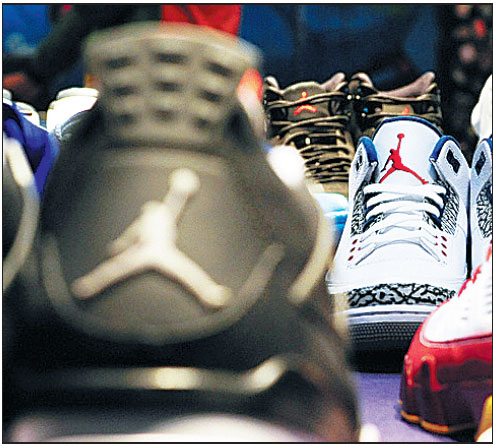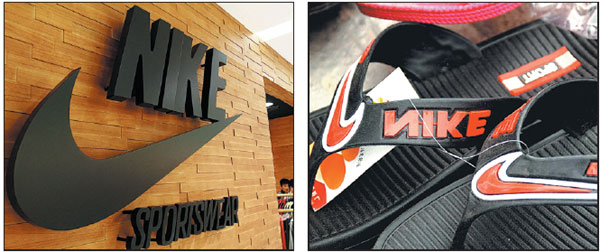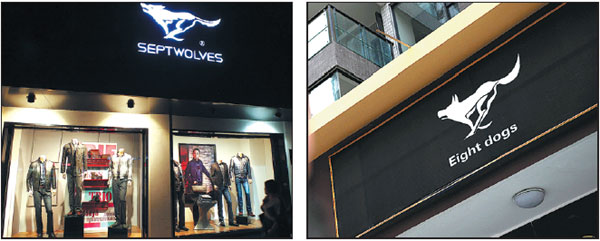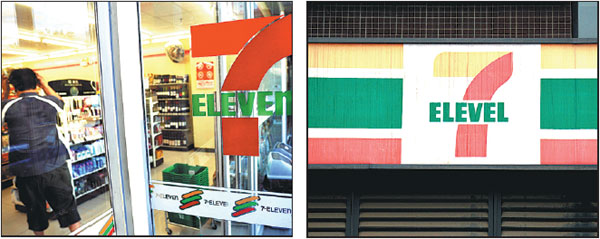Trademark law set for major shakeup
font-size:
New regulations to clarify the use of brand logos and prevent infringements will come into force soon. Zhang Yi reports.
If you were setting up a business in China, you might think that names such as "Harry Potter", "007" or "MacKFC", would be fantastic for new products or services, and you would probably be thrilled to discover that they haven't been registered as trademarks.
In the past, you may have gotten away with registering such trademarks, but if you use any of these names after March 1, you will quickly find yourself in trouble. On that date, a regulation regarding trademark protection will come into force to prevent companies from riding on the coattails of well-known brands.
The regulation, issued by the Supreme People's Court, the nation's top legal chamber, took three years to formulate. It stipulates that well-known characters, including those in books and movies, who are protected by copyright law cannot be used as trademarks by any entity that does not hold the copyright, unless they have been granted specific permission.
To help courts at all levels to implement the new regulation nationwide, details of five rulings handed down by the Supreme People's Court in recent years have been issued as legal precedents.
In 2011, one of the benchmark lawsuits was decided in favor of Danjaq LLC, the producer of the James Bond movies, which brought litigation against a Chinese condom producer that had used the Chinese characters for "James Bond, 007" and the name in English on the logo for its products.
The company, called "Bangde 007" in pinyin, the romanized form of Chinese, and pronounced "Band 007", argued that its "Bongde 007 Bond" trademark had been approved in 2002 by the trademark review and adjudication board at the State Administration for Industry and Commerce. Moreover, it was being used for a category of goods wholly unrelated to the fictional character or the movies.
The Beijing High People's Court ruled that the company had violated the "principle of good faith" required under China's trademark law when a trademark is registered.
In addition, the prior right (or copyright) of the James Bond character had long been established, and trademarks are not allowed to infringe on an existing right, according to the court.
Stipulations
"The application for registration and the use of a trademark shall be made in good faith" was written into an amendment to the trademark law, which took effect in May 2014.
The amendment also stipulated that attempts to register a trademark would not be approved if the name infringes on a prior right or is regarded as a malicious application of an unregistered trademark that has been used by another entity.
"The amended law can be seen as a turning point in trademark protection in China, after which there has been a discernible shift towards greater protection for brand owners", said Edward Chatterton, a Hong Kong-based partner at the international law firm, DLA Piper.
Trademark approval offices and the courts have been more willing to rule on grounds of bad faith in cases of trademark piracy and invalidate maliciously registered trademarks, Chatterton said.
A guidebook issued by the Beijing High People's Court in January 2014 makes it clear that copyright is one of the prior rights mentioned in the amendment to the law.
Song Xiaoming, head of the civil division of the Supreme People's Court, said the name of a work of art and characters associated with it are not usually protected by Chinese copyright law.
However, works and characters that have attained a certain level of popularity carry a significant commercial value, which generates a legal right that should be protected, he said.
The regulation declared protection of the title of a work and the characters in it as trademarks, which demonstrates the top court's stance in encouraging honesty and integrity in business operations, he added.
Meanwhile, the Supreme People's Court has urged all courts to avoid overprotection of titles and characters, and protection should not be extended to those regarded as being fully in the public domain.
In recent years, the number of lawsuits related to trademark protection has risen rapidly at courts across the country, especially since 2011, when the courts were given the final say on trademark disputes instead of the trademark review and adjudication board at the State Administration for Industry and Commerce and its branches.
In 2015, more than 24,000 trademark cases were filed in courts across the country in 2015, a rise of 13 percent from the previous year, according to the latest annual report on the protection of intellectual property rights, published by the State Intellectual Property Office.
Sneakers produced by Qiaodan Sports, which uses a similar logo but is unconnected with Air Jordan.Provided To China Daily
Case numbers rise
According to statistics from the top court, more than 2,600 trademark cases were heard by the Beijing High People's Court between 2002 and 2009. In 2013, the number rose to 2,161, and in 2014, the court heard nearly 8,000 such cases.
In 2015, more than 7,500 cases were filed at the Beijing Intellectual Property Court, which was founded in November 2014-73 percent of them were related to trademarks, in addition to patent and copyright cases.
"The clear aim of the Chinese government, transmitted through the administrative bodies and courts throughout the country, is to deter trademark squatting and trademark infringement", Chatterton said.
"There is a lot of work to be done," he added, saying that he hopes the courts will require all parties in litigation to disclose a larger number of relevant documents in trademark cases to make it easier for trademark holders to prove the damage that has resulted from the infringement.
In addition to judicial efforts to strengthen the protection of trademarks, administrative organs at all levels have joined forces to tackle the problems involved in trademark registration, and reduce the risks of infringement.
Wang Lianjie, head of the Intellectual Rights Infringement Complaint Center in Beijing, said the application of trademark right, copyright and patent right, which together constitute intellectual property rights, is under the jurisdiction of three administrative departments.
For example, trademark registration has to be approved by the State Administration for Industry and Commerce and its branches, instead of the State Intellectual Property Office and its branches, she said.
She added that a pilot program has been launched to simplify government administration and better protect the three rights in Shanghai, which are now being overseen by the local Intellectual Property Bureau.
"It is international practice to grant one government entity, instead of three of them, the authority to oversee the protection of the three types of rights because they are closely related to each other. The initiative in Shanghai will be extended to other regions of the country as well as to the administration at the central government level," Wang said.
If you were setting up a business in China, you might think that names such as "Harry Potter", "007" or "MacKFC", would be fantastic for new products or services, and you would probably be thrilled to discover that they haven't been registered as trademarks.
In the past, you may have gotten away with registering such trademarks, but if you use any of these names after March 1, you will quickly find yourself in trouble. On that date, a regulation regarding trademark protection will come into force to prevent companies from riding on the coattails of well-known brands.
The regulation, issued by the Supreme People's Court, the nation's top legal chamber, took three years to formulate. It stipulates that well-known characters, including those in books and movies, who are protected by copyright law cannot be used as trademarks by any entity that does not hold the copyright, unless they have been granted specific permission.
To help courts at all levels to implement the new regulation nationwide, details of five rulings handed down by the Supreme People's Court in recent years have been issued as legal precedents.
In 2011, one of the benchmark lawsuits was decided in favor of Danjaq LLC, the producer of the James Bond movies, which brought litigation against a Chinese condom producer that had used the Chinese characters for "James Bond, 007" and the name in English on the logo for its products.
The company, called "Bangde 007" in pinyin, the romanized form of Chinese, and pronounced "Band 007", argued that its "Bongde 007 Bond" trademark had been approved in 2002 by the trademark review and adjudication board at the State Administration for Industry and Commerce. Moreover, it was being used for a category of goods wholly unrelated to the fictional character or the movies.
The Beijing High People's Court ruled that the company had violated the "principle of good faith" required under China's trademark law when a trademark is registered.
In addition, the prior right (or copyright) of the James Bond character had long been established, and trademarks are not allowed to infringe on an existing right, according to the court.
Stipulations
"The application for registration and the use of a trademark shall be made in good faith" was written into an amendment to the trademark law, which took effect in May 2014.
The amendment also stipulated that attempts to register a trademark would not be approved if the name infringes on a prior right or is regarded as a malicious application of an unregistered trademark that has been used by another entity.
"The amended law can be seen as a turning point in trademark protection in China, after which there has been a discernible shift towards greater protection for brand owners", said Edward Chatterton, a Hong Kong-based partner at the international law firm, DLA Piper.
Trademark approval offices and the courts have been more willing to rule on grounds of bad faith in cases of trademark piracy and invalidate maliciously registered trademarks, Chatterton said.
A guidebook issued by the Beijing High People's Court in January 2014 makes it clear that copyright is one of the prior rights mentioned in the amendment to the law.
Song Xiaoming, head of the civil division of the Supreme People's Court, said the name of a work of art and characters associated with it are not usually protected by Chinese copyright law.
However, works and characters that have attained a certain level of popularity carry a significant commercial value, which generates a legal right that should be protected, he said.
The regulation declared protection of the title of a work and the characters in it as trademarks, which demonstrates the top court's stance in encouraging honesty and integrity in business operations, he added.
Meanwhile, the Supreme People's Court has urged all courts to avoid overprotection of titles and characters, and protection should not be extended to those regarded as being fully in the public domain.
In recent years, the number of lawsuits related to trademark protection has risen rapidly at courts across the country, especially since 2011, when the courts were given the final say on trademark disputes instead of the trademark review and adjudication board at the State Administration for Industry and Commerce and its branches.
In 2015, more than 24,000 trademark cases were filed in courts across the country in 2015, a rise of 13 percent from the previous year, according to the latest annual report on the protection of intellectual property rights, published by the State Intellectual Property Office.
Sneakers produced by Qiaodan Sports, which uses a similar logo but is unconnected with Air Jordan.Provided To China Daily
Case numbers rise
According to statistics from the top court, more than 2,600 trademark cases were heard by the Beijing High People's Court between 2002 and 2009. In 2013, the number rose to 2,161, and in 2014, the court heard nearly 8,000 such cases.
In 2015, more than 7,500 cases were filed at the Beijing Intellectual Property Court, which was founded in November 2014-73 percent of them were related to trademarks, in addition to patent and copyright cases.
"The clear aim of the Chinese government, transmitted through the administrative bodies and courts throughout the country, is to deter trademark squatting and trademark infringement", Chatterton said.
"There is a lot of work to be done," he added, saying that he hopes the courts will require all parties in litigation to disclose a larger number of relevant documents in trademark cases to make it easier for trademark holders to prove the damage that has resulted from the infringement.
In addition to judicial efforts to strengthen the protection of trademarks, administrative organs at all levels have joined forces to tackle the problems involved in trademark registration, and reduce the risks of infringement.
Wang Lianjie, head of the Intellectual Rights Infringement Complaint Center in Beijing, said the application of trademark right, copyright and patent right, which together constitute intellectual property rights, is under the jurisdiction of three administrative departments.
For example, trademark registration has to be approved by the State Administration for Industry and Commerce and its branches, instead of the State Intellectual Property Office and its branches, she said.
She added that a pilot program has been launched to simplify government administration and better protect the three rights in Shanghai, which are now being overseen by the local Intellectual Property Bureau.
"It is international practice to grant one government entity, instead of three of them, the authority to oversee the protection of the three types of rights because they are closely related to each other. The initiative in Shanghai will be extended to other regions of the country as well as to the administration at the central government level," Wang said.




-
Previous:
-
Next:






